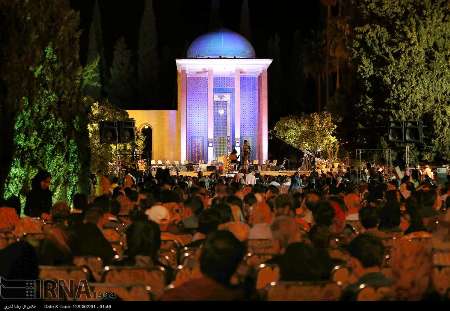'Last year, too, due to the people of Weimar's love for Iranian love poem composer, Hafez, thanks to Johann Wolfgang von Goethe's introduction of him to them, a Goethe sapling was planted in the garden of that internationally renowned Iranian poet in Shiraz,' said Mayor Wolf during the ceremony for the purpose.
'The relations, harmony, and friendship between Goethe and Hafez must lead to ever stronger friendship ties between the citizens of Shiraz and Weimar and today, thanks to such cultural exchanges, we are fortunately witnesses to the occurrence of this event,' he said.
A literary celebrity by the age of 25, Goethe was ennobled by the Duke of Saxe-Weimar, Carl August in 1782 after first taking up residence there in November of 1775 following the success of his first novel, The Sorrows of Young Werther.
The encounter of Goethe with Hafiz's Ghazals (love poems) became so inspiring to Goethe, that he produced his own West-Ostlicher Diwan and 'led the way to the discovery of Persian poetry by the Romantics', according to Shusha Guppy.
His West-Ostlicher, and collection of poetry in general, gradually came to function as 'an influential model for religious and literary syntheses between the ‘occident’ and the ‘orient’ in the 19th century', according to Jeffrey Einboden of Magdalene College in Cambridge, England, who is currently a professor at Northern Illinois University in DeKalb, IL.
Although Goethe's West-Eastern Divan was not a translation of Hafiz, he utilized the themes he found in the poetry of Hafiz. He interposed Persian terms in his poetry in order to convey a just idea of what Hafiz intended in his divan.
Indeed the work can be seen as the fusion of the Occident and the Orient. The West-Eastern Divan consists of twelve books all with Persian words: Moqqani-Nameh or Book of the Singer, Hafiz-Nameh or Book of Hafiz, Eshq-Nameh or Book of Lover, Tafakkor-Nameh or Book of Reflection, Rind-Nameh or Book of Ill Humour, Hikmat-Nameh or Book of Maxims, Timur-Nameh or Book of Timur, Zuleika-Nameh or Book of Zuleika, Saki--Nameh or Book of the Cupbearer, Matal-Nameh or Book of Parables, Parsi Nameh or Book of the Parsees and Khuld-Nameh or Book of Paradise.
This masterpiece by the German poet placed the Persian bard on a pedestal in the international arena. Goethe believed that it was now high time to envisage a humane global philosophy with no regard for nationality and creed and that the East and the West were not separate from each other. In reference to Hafiz, Goethe used such terms as 'Saint Hafiz' and 'Celestial Friend'. In his praise for Hafiz, he says:
HAFIS, straight to equal thee,
One would strive in vain;
Though a ship with majesty
Cleaves the foaming main,
Feels its sails swell haughtily
As it onward hies
Crush'd by ocean's stern decree,
Wrecked it straightway lies
The poetry of Hafiz evoked such passion in Goethe that he kept addressing him in his Divan. It was as if the two great poets had united in spirit and had become blood brothers. The passion of Goethe for Persian poetry is well reverberated in the following poems:
“DO ADMIT IT! The oriental poets
Are greater than us western poets.”
“May the whole world fade away,
Hafiz, with you, with you alone
I want to compete! Let us share
Pleasure and pain like twins
To love like you, to drink like you,
This shall be my pride, my life.”
Goethe believed that Persian poetic language culminated in the poetry of Hafiz in whom he found the very grandeur of thought and worldview he was seeking.
2329**2329

Shiraz, Apr 28, IRNA – Mayor of German city Weimar, Stephan Wolf, here Sunday evening planted a sapling titled the 'Goethe sapling' in the garden of internationally renowned Iranian poet Sheikh Mosleheddin Saa'di Shirazi's mausoleum.

